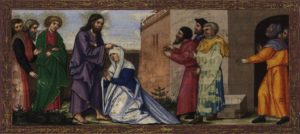Thoughts on Sunday’s Lessons for Aug. 25, 2019
First Reading (Track One): Jeremiah 1:4-10
Whenever God calls a prophet, the prophet-to-be almost invariably resists.

Heilung der gichtbrüchigen Frau am Sabbat (Healing the paralyzed woman on the Sabbath). Illumination (c.1530-1532) in the Ottheinrich Bible, now in the Bayerische Staatsbibliothek, the Bavarian state library. (Click image to enlarge.)
Moses thought he couldn’t speak well enough. Jonah just plain didn’t want to deal with the people of Nineveh. Isaiah thought his unclean lips weren’t up to the job. And Jeremiah? He just wasn’t old enough for this important job: “Truly I do not know how to speak, for I am only a boy!” But God reassures him: Even before Jeremiah was born, God knew him, and knew that he would be a prophet to nations and kingdoms, with power “to pluck up and to pull down, to destroy and to overthrow, to build and to plant.”
First Reading (Track Two): Isaiah 58:9b-14
The great prophetic book of Isaiah actually contains the work of three ancient writers in sequence, bible scholars say. The first Isaiah prophesied the coming destruction of Jerusalem and the temple; the second Isaiah may have been written while among Israel’s exiled community in Babylon; and the third Isaiah, who speaks Sunday’s verses, prophesied soon after the exiles returned home. The city and the temple lay in ruins, and the people were having a hard time settling back in. God will help us, the prophet promises; but we must be just, share with the needy and care for the afflicted. Do all this, the prophet says, and honor the Sabbath, and Judah’s ancient glory will be restored.
Psalm (Track One): Psalm 71:1-6
Sunday’s short Psalm fits well with the Track One first reading from Jeremiah. In these verses the Psalmist speaks rom a place of weakness and fear. Caught in the hand of the wicked, in the clutches of the evildoer and the oppressor, he calls out to God for refuge, seeking God’s protection and help. God knows us, as God knew Jeremiah, from before our birth. God is our strength and our hope, sustaining us through all our life.
Psalm (Track Two): Psalm 103:1-8
This is a hymn like the people must have sung on their arrival back in Jerusalem after the exile. Its message of thanksgiving has made it a favorite from ancient times down through the ages. “Bless the Lord, O my soul!” As we sing we remember that God forgives us, heals us and redeems us. We can count on God’s mercy and grace, gentle spirit and abundant love. We know that God insists on righteousness and justice for all who are oppressed.
Second Reading: Hebrews 12:18-29
Last week’s reading from Hebrews celebrated the Old Testament prophets who made up the “cloud of witnesses” that now stands with us as we follow in Jesus’ way. Sunday’s reading recalls how Moses received the Ten Commandments: The people were terrified as the the sky went dark, lightning flashed, thunder roared, and the earth shook with God’s power. But now, the author declares, continuing his argument that Christianity is the better way, we have a new covenant under Jesus. God gives us through Christ a kingdom that cannot be shaken.
Gospel: Luke 13:10-17
As an observant Jew and charismatic rabbi, Jesus knew well and faithfully followed the law demanding observance of the Sabbath. But his compassion for a painfully disabled woman compelled him to interrupt his teaching in order to heal her right there in the synagogue! The authorities were outraged at this breach of the Sabbath rules, but Jesus reminded them that they wouldn’t hesitate to protect their own property on the Sabbath. Why should a woman who has been in pain for 18 years have to wait even another hour? This story has a deeper subtext as we continue Jesus’ journey toward Jerusalem and the cross: It reveals growing tension between Jesus and temple and state authorities that would culminate with his passion and death.
What are “Track 1” and “Track 2”?
During the long green season after Pentecost, there are two tracks (or strands) each week for Old Testament readings. Within each track, there is a Psalm chosen to accompany the particular lesson.
The Revised Common Lectionary allows us to make use of either of these tracks, but once a track has been selected, it should be followed through to the end of the Pentecost season, rather than jumping back and forth between the two strands.
For more information from LectionaryPage.net, click here.
